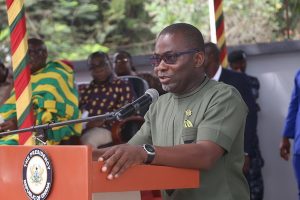With the modern-day consumer demanding greater accountability and sustainability, the Kimberley Process (KP) must not be left behind, says World Diamond Council (WDC) president Edward Asscher.
He spoke during the opening of the 2021 Intersessional Meeting of the KP, highlighting how consumers want to know about a diamond’s provenance and want to be assured that the diamonds they are buying are making a positive impact on the world.
The prevailing subjects on the agenda of the international community and the diamond industry are human rights, environmental protection and social justice, which are certainly being advanced outside of the KP, and hence Asscher’s call for it not to be left behind.
The KP Intersessional Meeting, which is being virtually held this week, is one of two regularly scheduled meetings conducted by the KP in any calendar year, with the other being the KP Plenary.
The WDC, which, together with civil society, has observer status in the KP, represents the industry in the tripartite forum charged with eliminating the trade in conflict diamonds.
Noting that consumer desire is the only value driver for diamonds, Asscher stressed that not meeting consumer expectations presents a real risk for the industry, as well as for countries who rely on diamonds for their economic wellbeing and stability.
“If the KP is left behind, it runs the risk of becoming irrelevant, and so may the category of natural diamonds. Let us not forget that consumers have alternatives. Meeting their trust and ensuring their confidence needs must be at the top of our agenda,” he stated.
Asscher referred to the imminent introduction of the WDC’s new System of Warranties, which he said would “help all participants in our business sector with best practices, compliance and due diligence when purchasing diamonds. We are sending a strong signal that we are ready to reform, and that we do not want to be left behind.”
The WDC president concluded his address by reiterating the spirit of the KP and of the community that the KP unites, and of its members’ aim to protect the integrity of natural diamonds.
“This must be done within the KP – in this very forum – and not elsewhere,” he said, adding that the rights of those who are connected to the diamond industry must be protected, whether they reside in producing countries, polishing countries or the jewellery markets.
“We are all here to protect the integrity of the whole diamond value chain in every aspect: human rights, social rights and environmental protection. We can only achieve results if we work together.”
The KP started when Southern African diamond-producing States met in Kimberley, South Africa, in May 2000, to discuss ways to stop the trade in ‘conflict diamonds’ and ensure that diamond purchases were not financing violence by rebel movements and their allies seeking to undermine legitimate governments.
The KP Certification Scheme was, subsequently, established in 2003.







